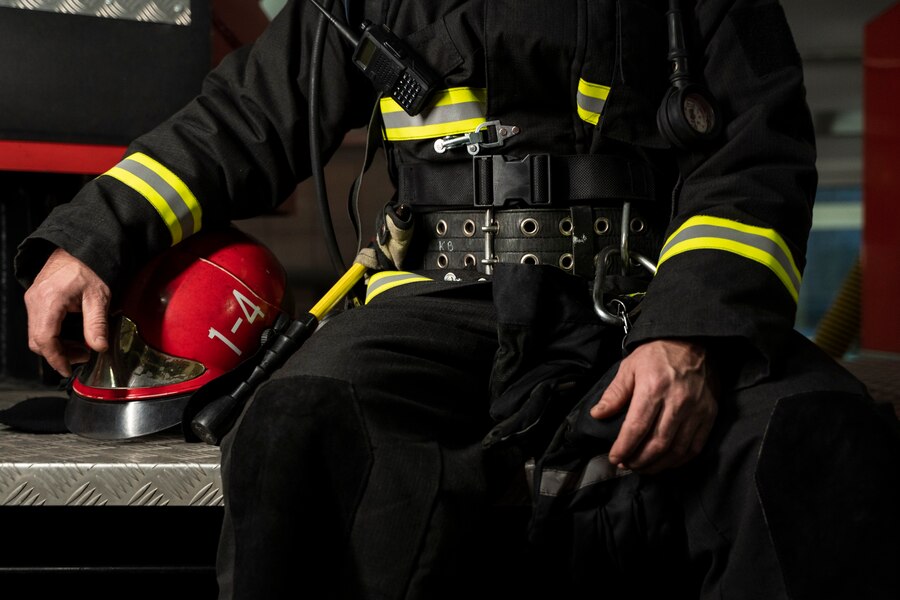Fire safety is critical to ensuring the security and well-being of your home and loved ones. Having the knowledge and tools to prevent and mitigate its impact in a fire can make all the difference. That’s why it’s essential to be proactive in implementing expert fire safety tips in your home. From installing smoke alarms to creating a fire escape plan, there are simple yet effective measures to protect your home from the devastating effects of a fire.
Install Smoke Alarms
Working smoke alarms in your home is crucial for early detection of a fire, giving you and your loved ones precious time to evacuate safely. Smoke alarms detect smoke before the flames become visible, alerting you to the danger even while you sleep. To ensure maximum effectiveness, installing smoke alarms in every sleeping area, outside each sleeping area, and on every level of your home, including the basement, is recommended.
Testing your smoke alarms regularly is essential to ensure they are functioning correctly. Additionally, consider interconnected smoke alarms, so if one alarm sounds, they all sound, providing a comprehensive warning system throughout your home. Installing and maintaining working smoke alarms in suitable locations can significantly increase your chances of surviving a house fire.
Test Smoke Alarms Regularly
Regularly testing your smoke alarms is crucial to maintaining their effectiveness in protecting your home from fires. You should test your smoke alarms at least once a month by pressing the test button on the alarm. This simple task ensures the alarm functions appropriately and will alert you to potential danger. In addition to monthly testing, you replace the batteries in your smoke alarms at least once a year or whenever the low battery warning chirps are essential.
Keeping your smoke alarms in good working condition is essential for early detection of fires and can save lives. By testing your smoke alarms as a regular part of your home maintenance routine, you can rest assured that your home is adequately equipped to handle a fire emergency.
Create a Fire Escape Plan
Creating a fire escape plan is essential for ensuring your family’s safety during a fire emergency. Here are some tips for creating an effective fire escape plan:
- Draw A Floor Plan Of Your Home: Drawing a floor plan of your home helps identify all possible exits, such as windows and doors, for each room. This allows you to plan multiple escape routes if one is blocked during a fire emergency.
- Designate A Meeting Spot: A meeting spot outside your home is crucial for accountability and ensuring everyone is safely out of the building. Choose a safe location from the house, like a neighbor’s driveway or a specific tree in the yard.
- Practice Your Escape Plan: Practicing your fire escape plan through regular drills with your family helps reinforce the actions to take in an emergency. This ensures that everyone knows their role and can evacuate quickly and efficiently.
- Assign Roles: Assigning roles to family members, such as one person helping young children or elderly family members, ensures that everyone has assistance in evacuating safely. Assigning specific tasks can help streamline the evacuation process.
- Test Smoke Alarms: Regularly testing your smoke alarms is essential for early detection of fires. Ensure your alarms are correctly installed, have working batteries, and are tested monthly to provide the earliest possible warning in case of a fire.
Check Electrical Cords and Appliances
Regularly checking electrical cords and appliances is crucial to preventing fires and electrical hazards in your home. Here are some essential steps to follow:
- Inspect Cords For Damage: Inspecting cords for damage, such as fraying or exposed wires, is crucial for fire prevention. Promptly replacing damaged cords minimizes the risk of electrical fires and ensures the safety of your home.
- Avoid Overloading Outlets: To prevent overheating and fire hazards, it is vital to avoid overloading outlets. Distribute appliances evenly among outlets and power strips to maintain a safe electrical load.
- Keep Cords Out Of High-Traffic Areas: Keeping cords out of high-traffic areas prevents wear and tear that can lead to overheating and electrical hazards. Organize cords neatly and avoid placing them near water sources to reduce the risk of shock.
- Unplug Appliances When Not In Use: Unplugging appliances when not in use reduces the risk of overheating and conserves energy. This simple practice also minimizes the chance of electrical fires caused by faulty wiring or malfunctioning devices.
- Use Surge Protectors: Surges protect electronic devices from power surges, preventing electrical damage. Invest in quality surge protectors to enhance the safety of your appliances and prevent potential fire hazards.
Keep Flammable Items Away from Heat Sources
Keeping flammable items away from heat sources is essential for preventing fires in your home. Flammable materials such as paper, fabric, chemicals, and aerosol cans can easily ignite if they come into contact with heat sources. Here are some essential tips to follow:
- Keep Flammable Items At A Safe Distance From Heat Sources: Store flammable materials away from heaters, stoves, fireplaces, candles, and other heat-producing devices. Maintain a safety zone of at least three feet around these sources.
- Store Flammable Liquids Properly: Store fuels, cleaning products, and other flammable liquids in tightly sealed containers in a well-ventilated area away from heat sources. Please keep them in a cool, dry place to reduce the risk of ignition.
- Be Cautious With Cooking Oils And Grease: Avoid leaving cooking oils and grease unattended on the stove or near heat sources. Clean up spills promptly and safely dispose of used cooking oil to prevent accidental fires.
- Use Caution With Smoking Materials: If you smoke, ensure that cigarette butts are properly extinguished and disposed of in a non-flammable container. Never smoke in bed or near flammable materials.
- Be Mindful Of Electrical Devices: Avoid flammable materials from electrical outlets, cords, and appliances. Overloaded electrical circuits and faulty wiring can generate heat and pose a fire hazard.
Have a Fire Extinguisher
A fire extinguisher in your home is a crucial safety precaution that can help you quickly and effectively respond to small fires before they escalate. It is essential to have the correct type of fire extinguisher for the specific hazards present in your home, such as Class A for ordinary combustibles like wood and paper, Class B for flammable liquids, and Class C for electrical fires.
Ensure that your fire extinguisher is easily accessible and in good working condition by checking the pressure gauge regularly and scheduling annual maintenance inspections. Familiarize yourself with the proper operation of the extinguisher by reading the instructions and conducting practice drills. By having a fire extinguisher on hand and being prepared to use it in an emergency, you can help protect your home and loved ones from the devastating effects of a fire.
Stay in the Kitchen While Cooking
Staying in the kitchen while cooking is a simple but effective way to prevent kitchen fires and ensure your safety. Unattended cooking is a leading cause of residential fires, and staying present allows you to respond to any potential hazards that may arise quickly. By keeping an eye on the stove or oven, you can prevent food from burning, pots from boiling over, or grease from igniting. If you need to step away from the kitchen, even briefly, turn off the stove or oven to eliminate the risk of a fire starting in your absence.
Additionally, by staying in the kitchen, you can supervise any children or pets nearby and ensure they don’t accidentally come into contact with hot surfaces or open flames. Practicing this simple safety habit can significantly reduce the likelihood of a kitchen fire and promote a secure cooking environment in your home.
Keep Matches and Lighters Out of Reach of Children
Keeping matches and lighters out of reach of children is an essential safety practice that can help prevent accidental fires and injuries in your home. Children are naturally curious and may not fully understand the dangers of playing with matches or lighters. By storing these fire-starting devices in a secure place out of children’s reach, such as a locked cabinet or high shelf, you can reduce the risk of them being accidentally ignited.
Teaching children about fire safety and never playing with matches or lighters is also essential. By instilling these safety habits early on, you can help protect your children and your home from the devastating consequences of a fire. Taking these proactive measures can provide peace of mind and promote a safe living environment for your family.
Educate Children on Fire Safety
Educating children on fire safety is crucial to help them understand the potential dangers of fire and how to prevent accidents. Teaching children about fire safety can empower them to make safe decisions and respond effectively in emergencies. Some vital fire safety lessons for children include:
- Not playing with matches or lighters.
- It is knowing how to escape from a fire.
- Understanding the importance of smoke alarms.
- Practicing fire drills at home.
By emphasizing the importance of these topics and regularly reviewing fire safety practices with children, you can help instill a sense of responsibility and preparedness. Encouraging open communication and addressing any questions or concerns they may have about fire safety can also help reinforce these important lessons. Educating children on fire safety can help protect them, your home, and your family in a fire.
In conclusion, fire safety is paramount in protecting your home and your loved ones. By implementing the expert tips provided by Anne Arundel County Professional Fire Fighters Local 1563, you can create a secure environment that reduces the risk of fire hazards. Remember to install smoke detectors, create a fire escape plan, and regularly check for potential fire risks.
By staying vigilant and prepared, you can prevent the devastating consequences of a house fire. To learn more about fire safety and how you can further protect your home, contact Anne Arundel County Professional Fire Fighters Local 1563 at 410-987-1180. Your safety is our top priority.

